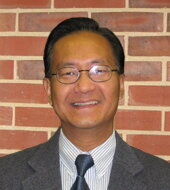
After 36 years of teaching at the University of Illinois, our colleague Kai-wing Chow retired in May 2024. Chow is a highly esteemed historian of China with an international reputation. His areas of expertise include Chinese intellectual history, history of printing and publishing, and new cultural history. His works have been well received across mainland China, Taiwan, Korea, Hong Kong, North America, and Europe. He has been with us as a professor of History and East Asian Languages and Cultures since 1988.
At his retirement party in June 2024, Chow reflected on his career and described it “as a journey from insignificance to significance.”
“In the beginning I didn’t know the meaning of history, and eventually over 40 years I came to know the meaning of history,” he said.
Chow grew up in Hong Kong. As a teenager he did not aspire to be a historian but a rock star. He enjoys English pop songs and has learned to play the guitar. After being inspired by a history teacher in high school, he went to Hong Kong Baptist College and received his BA in history. Today he keeps his love of music alive by hosting karaoke parties at home.
In 1978, he received his MA from the New Asia Institute of Advanced Chinese Studies in Hong Kong. The next year he entered the PhD program in history at the University of California, Davis, supervised by Kwang-Ching Liu, a renowned scholar of Chinese economic history. Upon graduation in 1988 he began teaching as an assistant professor at the University of Illinois, Urbana-Champaign in the fall.
Chow has authored many publications over the years and has made extensive contributions to the study of Ming-Qing publishing culture and Chinese intellectual history. He is the author of two books: The Rise of Confucian Ritualism in Late Imperial China: Ethics, Classics, and Lineage Discourse (Stanford University Press, 1994), and Publishing, Culture, and Power in Early Modern China (Stanford University Press, 2004). The translated versions were also published and well-received in China and Korea.
He has also co-edited four volumes of collected articles: Imagining Boundaries: Changing Confucian Doctrines, Texts, and Hermeneutics (SUNY Press, 1999), Constructing Nationhood in Modern East Asia (University of Michigan Press, 2001), Printing and Book Culture in Late Imperial China (University of California Press, 2005), and Beyond the May Fourth Paradigm: In Search of Chinese Modernity (Rowman and Littlefield, 2008).
Chow is also a beloved teacher and mentor to his students and is known for his generosity with his time and dedication to guiding students. Throughout his academic career, he has advised 14 PhD students, 10 of whom have graduated. He has also supervised 12 master’s students and served on the dissertation committees of over 40 PhD candidates. Many of his former students now hold academic positions around the world, particularly in the U.S., mainland China, Taiwan, Hong Kong, and South Korea. Additionally, approximately 4,500 undergraduate students have taken Professor Chow’s classes at Illinois.
At his retirement party, many of his colleagues and former graduate students spoke about the profound impact he has had on their careers.
One of his graduate advisees said, “Professor Chow is easily one of the smartest and most dedicated scholars I’ve ever met. He’s incredibly patient and always takes time to give helpful feedback on our research ideas. Plus, he genuinely cares about his students’ well-being, both mentally and physically. He has really set a great example for us, not just as a scholar but also as a mentor.”
Chow describes teaching as a lifelong learning experience and one of his great joys.
“I teach students, but of course my students also teach me. I have learned a lot from my students,” said Chow. “They push me out of my comfort zone . . . I think it’s really rewarding, and I have really enjoyed being a teacher. And I have enjoyed being a researcher. I’m coming to the end of one chapter of my life and I’m ready to open a new chapter.”